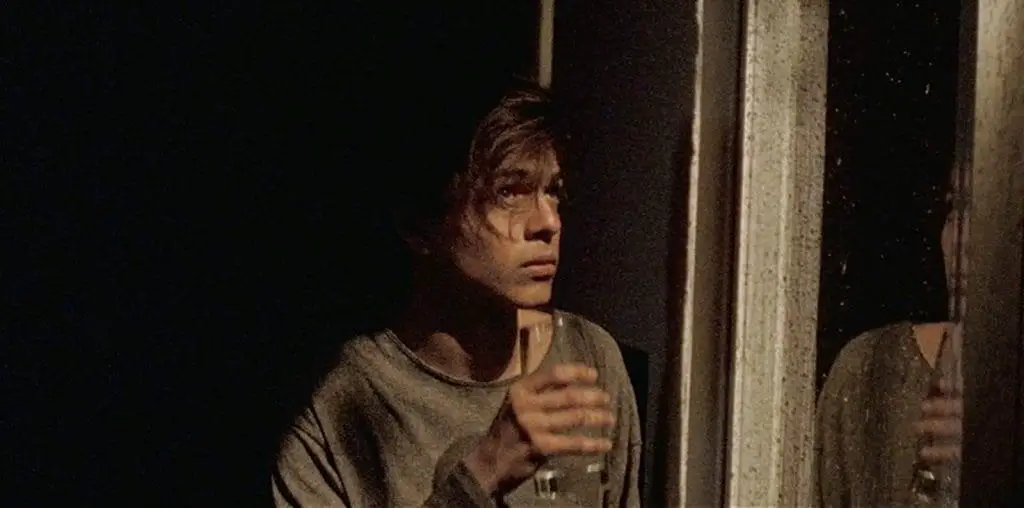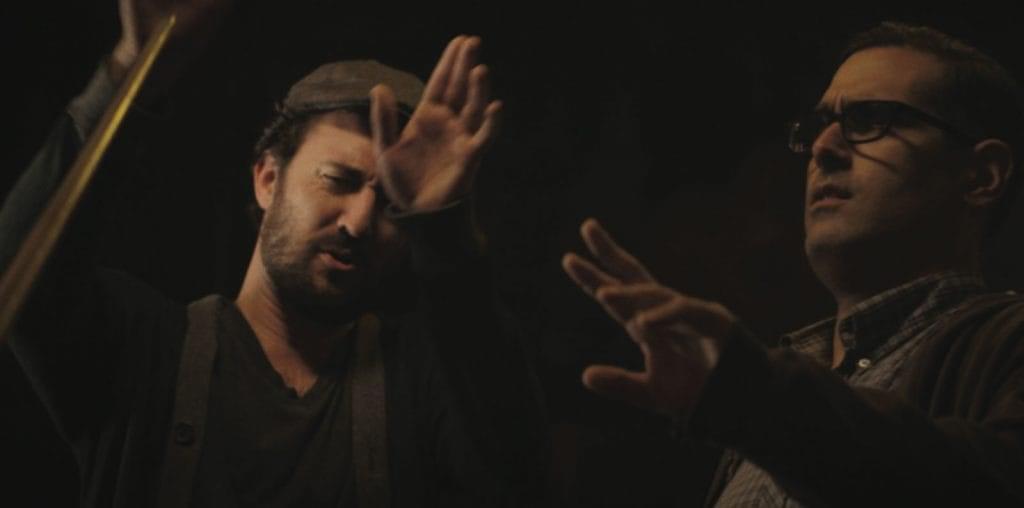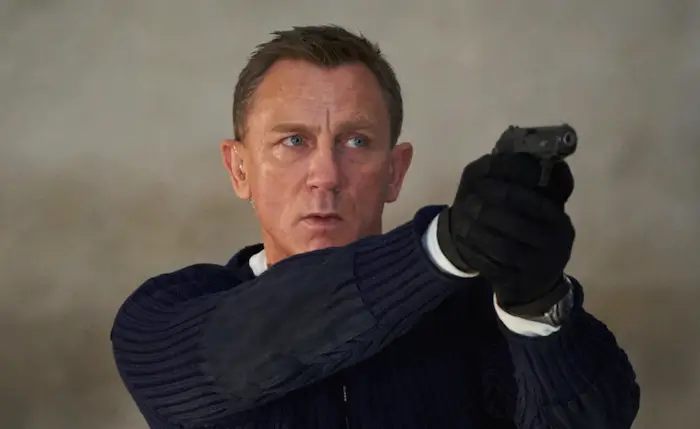
Luck is a four-letter word to double glazing salesman Paul Hunt (Duncan Clark Finnigan). He works for one of the most obnoxious bosses you could ever imagine, the notorious loudmouth Big Al (Gordon Grant), who makes his employees wear glasses door-to-door to make them look “15% more intelligent.” Paul’s just been mugged of £1000 (all his wages) and his wife (Wilma Smith) is just about to drop a baby. Not only that, but his dad has had a stroke and needs constant medical attention.
The put-upon (lousy) window salesman has to come up with the mortgage money he’s been robbed of somehow, and concocts a series of rubbish schemes and scams to try and get financially flush again. But things just aren’t working out right. He’s running out of time and patience and so is Big Al…
So runs the scenario for new Scottish film Four Eyes, (named after the lead character’s glasses) the latest shot-on-video comedy from husband-and-wife team Duncan Clark Finnigan and Wilma Smith. If it sounds grim, it’s really not. Easily the best film I saw at the Edinburgh International Film Festival this year, Four Eyes mixes pathos, pain and piercing, excellent-dialogue-driven humor (only film to bring tears of laughter to my eyes at the EIFF) to come up with a dramatic brew that’s absolutely superb. The world needs more films like this. Trust me.
I caught up with the extremely pleasant Duncan and Wilma at Behind The Wall, easily one of the best pubs in my hometown of Falkirk. There we discussed police line-ups, Scottish humor, Sean Connery at the film’s premiere, Jackson Pollock (for some reason) and various other topics too numerous to enumerate. And we have special guest vocals later on in the piece from somebody who will remain nameless right now. So without further ado, ladies and gentlemen…two extremely talented filmmakers and their vision for the future of Scottish humor…
Both of you tell me about your filmic background and how you met.
DUNCAN: I actually was a painter and decorator until I was 19 and I hated it. So I went into theatre for two or three months, I just discovered it by chance, by phone calls. So I got a job in the theatre. I didn’t like that either but I met a lot of people there who worked in film and television, people like actors and guys who were actually filming the shows. So I went to Coatbridge College for a year and took an NC (National Certificate) in Video Production. I took a year out cos I couldn’t find anything, thought I’d get a job after that but just didn’t, then went to college down in Greenock and did an HNC (Higher National Certificate). The option was to go to uni(versity) for four years and I thought – four years at uni!? I couldn’t do it so I came out and tried for about a year-and-a-half to find a job, couldn’t get anything. So I went and became a volunteer in the Glasgow Film And Video Workshop, as it was called at the time, it’s now called the Glasgow Media Access Center. I worked there voluntarily part-time for five years. And what I did for five years, if you want it was like my uni, I got a lot of work experience. I met Wilma in 199…5? (He looks across at Wilma and she nods in agreement. Just as well you remembered that Paul, women hate guys who don’t remember anniversaries and dates! – Graham) We met in a nightclub, it was nothing to do with film and television-
WILMA: We both come from Coatbridge.
DUNCAN: And Wilma said – what do you do? And it’s tall poppy syndrome, if you come from a small town you can’t turn round and say – yeah, I’m a filmmaker – cos people will be like – yeah, f**k off! I said, “I’m a technician” and Wilma, well, (to Wilma) you were nursing at the time…
WILMA: Aye, I used to work in a nursing home.
DUNCAN: Wilma was just gonna go to uni to do photography. She said that to a guy one time and he was just, “you think you’re fuckin’ great, don’t you, cos you do photography?” and he walked away and you’re like – Okay then, that’s the end of that conversation…
Tolerant Scotland, doncha just love it?
(Duncan and Wilma laugh)
DUNCAN: So Wilma went back to uni…
WILMA: Aye, I went to school, but I got into filmmaking at school when I was a teenager, and I got into photography as well. You know when you go to the Careers Officer and that? (A classic Scottish ritual. Teenagers leaving school have any dreams of a life outside office drudgery, working in a shop or being a valium-addicted shoplifter destroyed by embittered Careers Officers ‘wisely’ giving them advice on their budding futures. Basically it’s a state-sponsored graveyard of artistic ambition – Graham) You’re not really encouraged to pick up on (photography or filmmaking), it’s not really considered a real job sort of thing. So I went to school and started working in a nursing home with the plan to go and do nursing. I did that for a couple of years and thought – no, I really do want to get into, like, filmmaking or so. Round about that time I started applying to different colleges and universities and stuff like that. And it’s at that time I met Duncan. Duncan had applied to the film course at Napier (University – where Lynne ‘Ratcatcher’ Ramsay graduated from in Photography before studying filmmaking in London – Graham) and I’d applied as well when I was old enough, but neither of us got in-
DUNCAN: There are so many people applying to these courses, a lot of them these wee middle class kids.
If you don’t mind me asking, how old are you?
DUNCAN: (Deadpan) I’m 21. (Laughs)
Aye, for the 15th time, aye…
DUNCAN: No, I’m 33.
WILMA: And I’m 26. And I ended up getting into the Arts School to do the Photography course, there was a bit of film in it, but it’s only one course out of four years.
DUNCAN: Because Wilma was a student we got a 50% discount on film so we shot three short films on 16mm with student loans-
WILMA: That’s what I did for my final Degree show, show these 16mm films.
I was actually going to ask you if you had filmed on film before, cos it can be really cost-prohibitive.
WILMA: You do get a good discount-
DUNCAN: If you’re a student, aye. Before we went to shoot “Black Coffee” we wanted to shoot it on 16mm. They were saying to Wilma, “We’ll shoot it on 16mm, don’t worry, don’t worry, we’ll get a good discount with you being a student,” (Wilma is laughing) but you’re talking about £10,000 and there’s no way we can afford that. So after months of (heavy sarcasm) ‘deliberating’ we eventually said – well we’ve got the cameras here, why don’t we just shoot it on digital? And we’d already shot one on digital as it was.
I haven’t seen that one, but from what I understand it’s been quite well received.
WILMA: Aye, it did quite well at a lot of festivals round the world. In fact (chuckling), we just found out the other day that it’s been (laughing) accepted for an (laughing harder) Indonesian film festival. (Duncan and I both join in laughing – Graham) I never even sent it to them cos I would never even have thought to send it to them. Last year, I think it was in April, it was shown at the official film festival in New Delhi, India, and I’m just assuming that the organizers from this Indonesian film festival were there and watched it there.
DUNCAN: We’re just picturing all these Indians like that, (in crap Asian accent, not trying to be offensive just amazed and amused at the thought of the screening) “What are they talking about? They are drinking that Buckfast!” (Buckfast is a time-dishonored ‘tonic’ wine manufactured by English monks in Buckfast Abbey which is a staple craze-producing firewater favored by Scotland’s finer unwashed baseball cap-wearing violent white trash types, known jovially as ‘neds’ in this country. A night on the Buckie and these heid-the-baws are ready to take on the world – it’s basically like liquid PCP and tastes absolutely vile. You can’t say this site isn’t educational – Graham)
Even my maw couldn’t understand some of the dialogue (in Four Eyes), she was just like, “It’s too fast!” And I was sitting there and the subtitles are just flashing by as well!
WILMA: Too quick. That’s something you learn, but, intit.
Is “Black Coffee” a comedy as well?
WILMA: Aye, but it’s not as funny as Four Eyes.
DUNCAN: It’s got its humorous moments, but it’s more straightforward, very straightforward.
WILMA: Aye, “Black Coffee’s” very, very character based. It’s the kinda same thing. “Black Coffee’s” about an unemployed guy going around lying, tricking all these women into giving him money and things like that…
You been videotaping me?
(Wilma and Duncan laugh)
Apart from the bit about getting money out of women. (Getting more serious) Obviously, (to Duncan) you wrote Four Eyes, (to Wilma) do you have any input into the writing at all?
WILMA: Some parts.
DUNCAN: What we’ll do is that I’ll come up with, say, a story involving a cigar and Wilma’ll say, “Oh come on, would you watch a film with that scenario in it?” “Naw.” So we bounce ideas off each other. I mean it’s good to have somebody to hit ideas off of cos you’re sitting thinking, “Aye your writing’s s**t, I’m stuck here.” And you’ll say to Wil, “Well what do you think of this, cos I want you to get right into it.” So I wrote the background and Wilma then looks at it and changes wee bits here and there. We’re in the process of writing two things just now, Wilma’s writing one and I’m writing the other. And what we’ll do is when we finish the whole script we’ll swap them over and then do rewrites, but keep the originals, and do a rewrite and see what we think.
That’s a good way to see how your styles can mix and meld together, eh? When I was watching Four Eyes what struck me was that the dialogue was incredibly naturalistic, you’ve got a really good ear for dialogue. I mean there was not a duff moment. At the film festival I watched Wilbur (Wants To Kill Himself). The scriptwriter’s Danish, right, and because they haven’t corrected his dialogue a lot of it sounds really stilted and forced and unnatural. They needed to do a dialogue polish on that cos it really just sounds bad. But in Four Eyes the dialogue was so naturalistic and there wasn’t a bad performance in the entire film.
WILMA: Thanks very much.
It’s weird because you’ll know having grown up in Scotland yourselves that ye don’t really get many films, up until this point at least, that you can really plug into and relate to much. How did you get the idea for the dialogue for Four Eyes?
DUNCAN: Well, it was just in the natural process cos we’ve got a few short films and they weren’t actors in them…I mean, there’s nothing wrong with their acting, that sounds terrible…the dialogue that I wrote, they then took it straight from the page and said it to camera. In rehearsals it came across really well, but during filming it was stilted, it was bad, it was really ham. I watch it now and I cringe, and I know every single bit of dialogue. From our point of view (with Four Eyes) we thought, “Let’s try and change it, let’s try and make it natural, how do you make it natural?” Well, first of all we thought, “Let’s get some non-actors anyway” cos we thought that would be good.
WILMA: They were good, the non-actors, because the film we were making had no money in it, we were using a lot of friends and family.
DUNCAN: The situation is, let’s say we were using (to Graham) you, I’d say, “Listen, here’s the scenario and I’ll give you key points” and then we’ll sit down and go through the dialogue. Then everything you’re saying is from the top of your head, and you’re not actually thinking about the lines that you’ve read. I think it does come across very natural.
I’m not emotionally attached to the film, I can take a step back. I showed it to my parents…I don’t show them stuff, they generally don’t appreciate it. But I knew they would appreciate it. The dialogue totally did flow, the vernacular, you really nailed it really well. What you’re talking about sounds like a really interesting way of writing dialogue cos it has worked perfectly and if you were gonna shoot stuff in the vernacular in the future you could use the same kind of method.
DUNCAN: I know a lot of filmmakers have got to adhere to certain markets, and certain accents and dialects won’t work, ie if you want Falkirk for example. (Mimicking foreigners watching film) “What accent’s that, that’s not Scottish.” They think of us very much as “how are you doing” and Sean Connery’s Scottish and you have to be very clear and stated so you don’t have to have subtitles, you don’t have to put that in certain films. Like Ken Loach’s film “Sweet Sixteen,” that had to have subtitles on it. I mean fair enough, I think that’s great he’s kept all of their accents, right, but from our point of view there are films where they’re talking and they’re supposed to be Scottish and I’m watching that and thinking, “That’s not a Scottish accent.”
The interview continues in part two of FOUR EYES AND NO LUCK>>>


